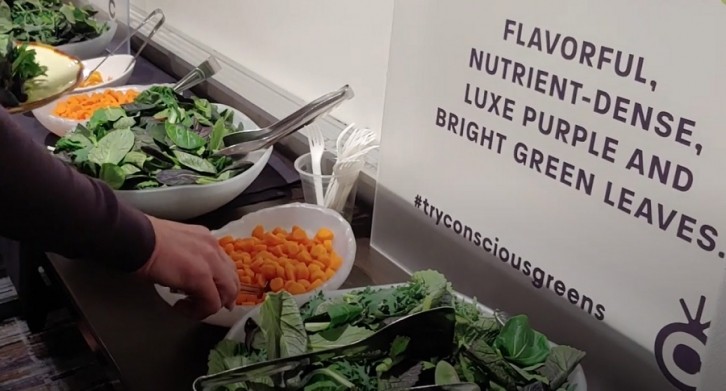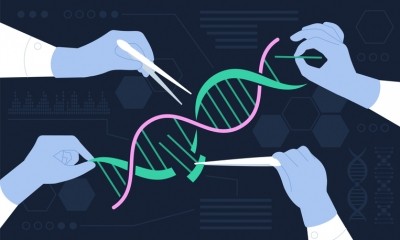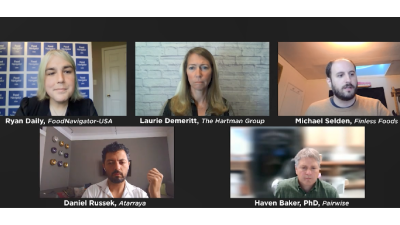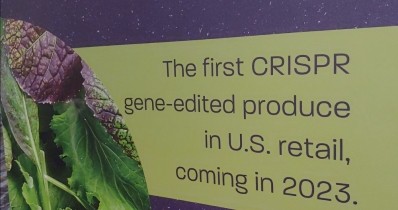Exclusive: Pairwise stops marketing gene-edited Conscious Greens to focus on new high-value, gene-edited crops

Last fall, when Pairwise launched Conscious Greens in select markets, it was the first food in the US developed with CRISPR technology, which allowed it to change the underlying DNA of mustard leaves to preserve their nutrition and vibrant purple hue but remove the off-putting bitter flavor commonly associated with members of the brassica family.
The launch gave the company a chance to test its hypothesis that when consumers were presented with a product that offered them tangible benefits, and which tasted good and was convenient, they would accept the technology used to create it.
“We passed with flying colors and received really, really positive feedback from consumers,” CEO and co-founder Tom Adams told FoodNavigator-USA. “Even [the 25% of] people who, when asked an abstract question in a survey about whether they would eat gene-edited food … were kind of skeptical, when you put the salad in front of them they ate it. Only about 1% of people didn’t want to eat the salad, and that is not even clear if it was because of the technology or the fact that it was not grown organically.”
However, Adams said, the company also realized that it did not have the resources to effectively market the salad kits and continue developing gene-edited products.
“Every dollar we spend on marketing is a dollar we don’t spend on producing the next interesting product,” Adams said.
“After really thinking hard about it, we decided rather than continue to try to push the marketing of the Conscious Greens, we would look for partnership opportunities with somebody who is more established in the salad business that can really do a better job with it,” Adams explained.
He added Pairwise is “in the process of identifying the right partner to take that product forward,” and he expects a deal to be reached in the first half of the year. Potential partnerships could center on either producing and marketing finished salad kits or growing and distributing the seeds for the greens that Pairwise has created with gene-editing.
“Our goal is [reach a deal] as quickly as possible. We don’t want it to be a distraction for us. We think we have created a good product. We want consumers to have that product available to them. It would be nice to get some return on the investment we have made to get this far. But part of the return we are getting and going to get is that we’ve helped to really blaze the trail for new genetic products, whether they are salads” or other produce, Adams said.
Pairwise pursues pitless cherries, seedless blackberries and other ‘game-changing product innovations’
This pivot will allow the company to “double down on our core competencies of the technology that we’re using to develop really unique products, like the salads,” including “game-changing product innovations,” such as seedless blackberries and pitless cherries made with CRISPR technology, Adams said.
He explained that Pairwise has made “good progress” towards the phenotypes that will produce high-yielding, seedless blackberries, but that the fruit is still a couple of years away from market.
The company also is exploring how to make pitless cherries, which Adams said are not that different from seedless blackberries, and which can be produced year-around in more diverse environments, including where it rains in the summer.
“Now, if it rains on a cherry, they split, and you lose the whole crop. So, we are working to change the architecture of the plant so that it can be grown much more like a blueberry under a hoop house, which would really broaden the production zone,” he explained.
If successful, the US cherry crop could grow from being worth a couple billion dollars to a global crop without pits worth upwards of $10 billion, according to Pairwise.
Like with the salads, Pairwise will have to decide how best to market its berries when they are ready – either directly to consumers or license the germ plasm more broadly, which would allow it to scale more quickly.
“We are in the process of really evaluating the opportunity of licensing. We think it might be a way to get faster to more people and again, like with the salads, allow us to focus on really what our core competency is, which is developing the products and using other people’s capabilities to distribute and market those products,” Adams said.
Partnerships, licensing-agreements speed innovation, open doors for Pairwise
Pairwise also will continue to pursue R&D partnerships and licensing agreements, such as those it has with Bayer and Tropic Biosciences.
Pairwise and Bayer announced last summer a five-year, multi-million dollar agreement to leverage Pairwise’s Fulcrum platform to optimize gene-edited short-stature corn that is 30-40% shorter than traditional corn and less susceptible to wind damage and climate change.
The deal followed a successful five-year pilot collaboration exploring how to grow more corn, soy, wheat, cotton and canola with fewer inputs on the same amount of land. During that pilot, Pairwise said it identified and delivered 27 novel traits to Bayer’s pipeline.
The company also is exploring licensing deals, such as an agreement with Tropic Biosciences that it announced in 2022, which focuses on big-acre, tropical crops, including bananas, coffee and rice. Through the partnership, Pairwise will use its base editing technology to “access traits that were not feasible with earlier editing technologies” and unlock “a greater scope of natural variation found in these crops,” the company said.























